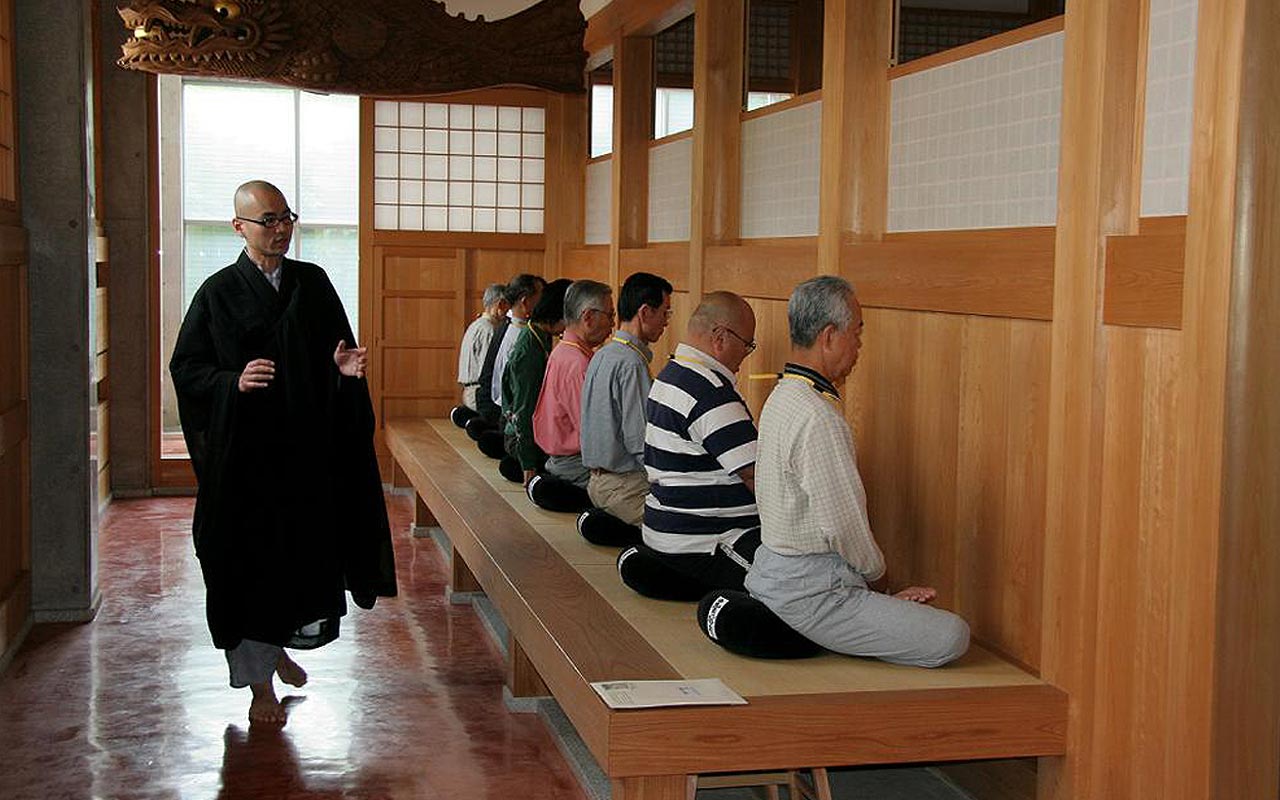Soto Zen (Soto-Shu)
Soto is the leading school of Zen Buddhism and was initially founded in China as the Caodong lineage of the Chan school of Buddhism.
Soto Zen was later imported to Japan in the thirteenth century by Dogen Zenji, after which it was called Soto Zen.
In the Soto school (曹洞宗) of Zen, Zazen, or sitting meditation, is the core of the practice. After all, Zazen was the vehicle of Buddha‘s Awakening. Shikantaza or “just sitting” is the essence of Soto Zen. There is no goal to be attained beyond the practice itself.
Soto Zen practitioners do not actively seek Enlightenment or Satori (the Zen Buddhist term for enlightenment), but rather they seek to fully experience every moment; that is, to be acutely aware of every action in the here and now. As Zen Master Taisen Deshimaru once said, “Zazen has no object, it is purposeless, it only brings us back to ourselves”. One doesn’t need to worry about Satori.
Even though Zazen is at the heart of Soto Zen, Soto Masters have never discarded the use of koans outside the practice of Zazen. Unlike the Rinzai koans that are very formal, Soto koans are more dynamic and sometimes represents the master’s spontaneous answers to a question, instead of being a predetermined question or riddle. Everything can be a koan, not just a special question or a special phrase, but life itself.
Practitioners of Soto Zen believed that Rinzai koans had become a formal technique. They thought that by putting too much emphasis on koans, the students of Rinzai Zen would be distracted by the urge to find an “answer” to the riddles by using mental faculties or the intellect, which, they believed, was opposed to the intuitive nature of Zen.
Soto Zen’s vision of Enlightenment, or Satori, is different than that of the Rinzai school. As opposed to what many people may think, in Soto Zen, Satori is not a special state of consciousness. It is simply a return to a human being’s original condition. It can be compared to the consciousness of a newborn baby that has not been “contaminated” in any way; that is, a consciousness that is pure and in full harmony with the cosmos and the universe.
Characteristics of Soto Zen
In exploring the distinct nature of Soto Zen, it is essential to consider its defining characteristics. These elements not only shape the practice and philosophy of this Zen school but also offer insight into its unique approach to the path of enlightenment. Below is an overview of the key characteristics that are central to understanding and practicing Soto Zen.
- Shikantaza Meditation: Central focus on “just sitting” meditation, where practitioners are fully present and observant without seeking specific experiences or states.
- Dogen’s Philosophical Teachings: Founded by Dogen Zenji, Soto Zen deeply values his philosophical teachings, which are intricate and profound.
- Seamless Practice and Daily Life: Emphasizes the non-duality of practice and everyday life, encouraging the integration of Zen principles into all aspects of living.
- Gradual Enlightenment: Advocates for a gradual process of enlightenment, cultivated consistently over time through practice and mindful living.
- Community-Centric Practice: Strong focus on sangha (community) practice, valuing the support and interaction within a spiritual community.
- Subtle Approach to Koans: While not as central as in Rinzai Zen, koans are sometimes used in a more integrated and less formal manner.
- Empirical Learning and Experimentation: Encourages a hands-on approach to understanding Zen principles through personal experience, experimentation in practice, and learning from the direct engagement with life’s varied situations.
Soto Zen offers a serene yet profound path for spiritual exploration and growth. Its emphasis on mindful presence and the integration of meditation with daily life can bring a deep sense of peace and clarity. I encourage you to embark on this journey, discovering the rich, subtle depths of Soto Zen practice.
Learn more about Soto-Shu: Soto Zen Official site

